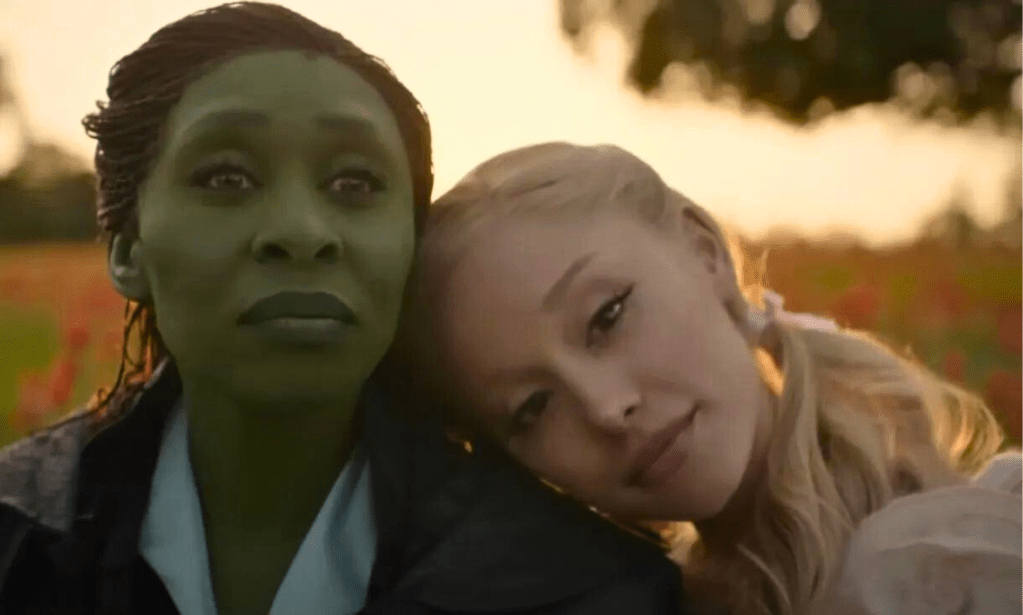Wicked review: Ariana Grande and Cynthia Erivo defy all expectations in spellbinding adaptation

Together, Cynthia Erivo and Ariana Grande are electric. (Universal Pictures)
Over the past few weeks, the seemingly endless press cycle for Jon M. Chu’s epic musical adaptation Wicked has become, it’s sad to say, horrendible.
Ariana Grande and Cynthia Erivo, who play Glinda the Good Witch and Elphaba, Wicked Witch of the West respectively, could fill a Shiz University classroom with the tears they’ve shed over their time working together. Greenwich in London has been renamed to the (admittedly witty) GreenWitch. Charli XCX led a mildly humorous Saturday Night Live sketch about stars auditioning for the film. We’re concerned for Jonathan Bailey’s eyelashes, for considering how much fluttering they’ve had to do on red carpets and in interviews recently, it’s a surprise they’ve not fallen out.
That’s all without getting into the actual scandalaciousness of it all: Erivo’s widely-derided reaction to a fan-made poster; Mattel’s porn-emblazoned Barbie dolls; Grande’s headline-grabbing relationship with co-star and Munchkin Boq, Ethan Slater.
What a relief then, to be able to say that it’s all been worth it. Wicked (Part One, might we add – the film’s promotional team certainly haven’t) is an absolute hoot.
Musical theatre aficionados and anyone who’s had an itch to know what all the fuss is about will know the plot by now. Like the stage show, the film prequel to The Wizard of Oz opens with Glinda and the citizens of Oz glorying in Elphaba’s death, before Glinda is forced to open up about her previous friendship with the green supposed antagonist.

We’re transported back in time to recount why Elphaba was born green in the first place, how Glinda and Elphaba went from strangers to roommates to classmates to pals (if you’re deep in your Wicked lore, you may be hoping for a touch of sapphic intimacy – but you’ll have to make do with wafer-thin undertones here), and why the people of Oz turned their backs on the once-promising sorceress. At this point, the film cuts off with a genuinely moving rendition of Wicked staple, “Defying Gravity”. It might be two hours and 45 minutes long, but again, this is just Part One, with Part Two set to arrive in November 2025.
Erivo recently caught heat on social media – the press cycle strikes again – for slighting actresses who joined her at the audition stage, as Chu searched for his Glinda. None of them compared to Grande she said, and catty comment or not, it’s hard to disbelieve her. Grande is a revelation in Wicked: she’s funnier than her detractors would ever let you believe; her Glinda consumed by whimsy with just a hint of Regina George.
In fact, the whole film is an enthralling Mean Girls-cum-Harry Potter-cum-Wednesday blend, and it’s truly joyous viewing. Erivo is astounding too, embodying the naivety and diffidence needed to turn one of history’s most famed villains into a relatable heroine. Together, they’re electric.
The supporting cast all get a fair slice of the screen time, though there is noticeable dearth of Jonathan Bailey’s Fiyero, considering the omnipresence of the actor’s chest and legs in the lead-up to the film’s release (that’s where Part Two comes in, of course). Michelle Yeoh is perfect as Madame Morrible, and Bowen Yang’s explicitly gay Pfannee is an underused highlight. There’s also the cameo(s) to end all cameo(s), in a scene which will elicit tears from even the most stoic of Broadway buffs.

As is now customary for all big budget adaptations of existing pop culture behemoths, social media was tearing into Wicked long before its cinema release date neared. Complaints of the trailer’s colour being washed out were fair, but the final product is a visual feast, each scene lit with bubblegum pinks, deep greens and soft blues. There’s no place like home, but Oz has never felt so warmly familiar.
That said, there are a few niggles. About half way in, my mind began to wander towards tomorrow morning’s emails – never a good sign. It’s simply so long (a colossal two hours and 41 minutes) that undivided attention is a hard ask, but the energy dip is fleeting.
There will likely be noise about the decision to include reference to Elphaba’s sister Nessarose (played by Marissa Bode) as “tragically beautiful”, simply because she’s paraplegic and in a wheelchair. Yes, it’s a line lifted directly from the stage show, but is it’s inclusion necessary? In 2024, disabled people don’t need to be told their lives are “tragic” for the fact. There are notes of positive disability representation though: Bode is the first actress to play Nessarose who is actually in a wheelchair in real life, while one scene early on sees Elphaba rage when her sibling is whisked away in her wheelchair without consent.
Some will also question the decision to include the musical’s most famous numbers – “Defying Gravity”, “Popular” – in Part One, leaving less showstoppers for Part Two. In honesty, it’s a smart move: this adaptation is so enchanting, not least because of its musical pacing, that punters will be rushing back for the second film regardless. I’ll certainly be in line for a ticket.
Here’s my truth: when I first saw Wicked on stage, I didn’t fall in love it. Granted, I was 11, and my tastes have likely changed. But after watching Chu’s adaptation, a return visit may be needed. Consider me spellbound.
Wicked is released in cinemas on Friday, 22 November.
Share your thoughts! Let us know in the comments below, and remember to keep the conversation respectful.
How did this story make you feel?

